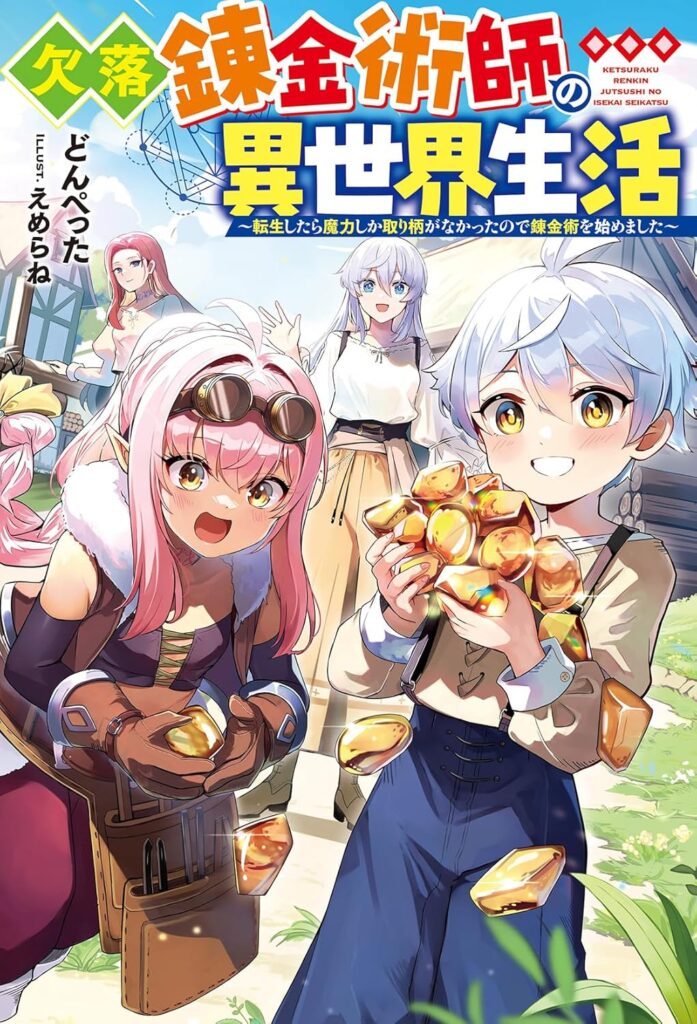
Kays Translations
Just another Isekai Lover~
Volume 1: Life in Helvendorp
Chapter 1: Reincarnated… as a Defective Product
“Fwaaaah… ahhh… I’m still so sleepy.”
My little body shuddered as an oversized yawn escaped me, the kind that seemed far too big for a five-year-old frame. The cool morning air tickled against my cheeks, carrying with it the faint smell of dew-soaked earth.
As always, I padded outside, feet bare against the packed dirt, and drew up cold water from the jar left in the yard. The shock of it against my face was enough to chase away the remnants of sleep. Afterward, I stretched, raising my arms high until my tiny bones cracked and my muscles loosened. That was my daily ritual. The beginning of another day in this strange, borrowed life.
“Haaah… still only five years old, huh?” I muttered, half in wonder, half in resignation.
My name is Arthur. It sounds like something a cat might bat around for fun, but that’s just coincidence.
It’s been five years since I was reborn into this world, and even now, surprises come at me every day. It’s tiring, honestly—exciting, but exhausting.
I remember fragments of my old life. I was Japanese. A man. That much is certain. But the finer details—my name, my age, the little facts that once defined me—are lost in the haze. All I know is that I lived, and then… I didn’t.
The baths and toilets of this world, at least, reassured me of my gender. Some knowledge can’t be erased, no matter the gap between lives.
When I first opened my eyes here, everything was alien. The words around me were noise, the faces looming over me unintelligible. I panicked. Somewhere inside, I screamed: Wait—don’t tell me… this is reincarnation?! In reality, all that came out was a shrill “Gyah, on, gyaaah!”
And of course, like any fool who’s ever read too many stories, my first thought was: What’s my cheat ability? I tried everything—imaginary menus, calling out “status,” straining for powers that never came.
The truth was cruel. Far from being a chosen hero, I was defective.
When I first saw my mother cast magic, the spark of hope reignited. I thought, Magic requires magical power. Then if I can find mine, I can use it too. Even before I understood words, I searched inward desperately until I felt it—a faint wellspring within. From that day on, I trained. I grew it, shaped it, nurtured it.
Two years later, when I finally understood the language of this world, the truth crushed me: I couldn’t use magic. Not at all.
Here, every person has magical power, tied to attributes—fire, wind, water, earth, or the rarer light and dark. Most had one or two. Talented ones wielded three. Geniuses could hold four or more. With them came spells of all shapes and wonders.
But me? I had none. Nothing.
It felt like a betrayal. I even sulked with the absurd thought: Was this punishment for dying a thirty-year-old virgin in my last life? A stupid joke, yes, but that’s how deep the despair bit.
Yet I wasn’t willing to waste the countless hours I had poured into nurturing my magic. If it couldn’t be used for spells, then there had to be something else. And that something… was alchemy.
But alchemy here was not the romantic transmutation of legends. No turning lead into gold, no philosopher’s stone. It was, in essence, a form of magical craftsmanship: extracting, refining, heating, shaping. More like a factory process than mysticism.
Machines, replaced by magic. That was alchemy.
At first, I thought it was incredible. My heart raced with possibility. Until I saw the price.
To practice alchemy, one needed tools: a transmutation plate, a transmutation cauldron. The cheapest plate cost three gold coins—about 1.8 million yen by my old reckoning. A cauldron? Twelve million. And you needed several plates, one for each function: heating, cooling, shaping.
It was an art locked behind walls of gold. And the cruelest twist? Alchemists weren’t even rich. They mostly produced potions, selling them in bulk at razor-thin margins. Many worked ten years or more just to pay off their initial costs.
The only reason the trade survived was because potions were essential, and lords subsidized their alchemists. And those alchemists? They were usually the second or third sons of nobility, heirs without inheritance but with family wealth.
For someone like me—poor, powerless, attribute-less—it was an impossible dream.
But I refused to give up. My mother deserved more from me, and I had no interest in being ordinary. Potions weren’t my aim. I hungered for the other side of alchemy—the processing of metals, the forging of possibility. That was something even I could grasp.
I believed, foolish or not, that if I combined it with the knowledge I still carried from Japan, I could create marvels this world had never seen.
The only hurdle was the mountain of gold I didn’t have.
Still, I wasn’t deterred. If plates were too expensive, why not build my own? They were made from rare metals—black steel, which blocked mana, and magic silver, which conducted it. Plates used these to shape the flow of magic. But if I could shape mana directly, maybe I could bypass them altogether.
There was only one problem: mana was invisible.
I tried, countless times, to sketch arrays by feel alone. They came out crooked, unstable. Mana bulged and twisted where it shouldn’t, and every attempt collapsed—sometimes literally in a burst of backlash. I couldn’t even manifest the simplest pattern, the Sphere, a child’s first step in transmutation.
How to solve the unsolvable? Simple. If mana couldn’t be seen, then I would make it visible.
I remembered the phenomenon of “mana fog”—a pale green mist that appeared naturally in the world, glowing faintly in the air. If I could recreate that mist within myself, then perhaps my own mana could shine before my eyes.
I dove into study. I learned that mana wasn’t just attributes—it had traits. Density. Hardness. Viscosity. By adjusting these, one could alter spells, empower or weaken them.
So I experimented. I categorized each trait into ten levels and tested every combination I could.
And from that obsession came two discoveries.
The first was mana materialization. By compressing density, I forced mana into a tight sphere. For the first time, I held my magic as if it were a tangible thing, a glowing bead of light.
When I told my mother, she smiled in wonder and said, “That is mana materialization. Few in the world can do it—it requires vast mana and absolute precision.”
Not a new discovery, but proof of my ability.
Still, it was flawed. The spheres were light, weightless, and they vanished within minutes if I stopped feeding mana. Useful in emergencies, perhaps, but little more.
I even tried to materialize full transmutation arrays, hoping they could substitute for plates. But once solidified, they became inert—mere designs without function. Another failure.
Even so, I pressed on.
Then came my true breakthrough.
While rereading my notes one evening, I remembered: fog is born from changes in humidity and temperature. If mana could mimic fog, then maybe temperature was the missing piece.
So I tested again.
Density four. Hardness one. Viscosity three. Temperature—five degrees Celsius.
And then it happened. My mana glowed faintly, soft green, drifting like mist.
For the first time, I saw it. My mana.
When I showed it to my mother, her eyes widened. “I’ve never seen anything like this,” she whispered.
At last—a true discovery.
I named it Rud—from “look” and “od,” the life force within. A childish name, perhaps, but names only matter if you believe in them.
And when I used Rud to draw an array? It bloomed alive before me, shining perfectly into existence.
This was only the beginning.
I still had countless patterns to master, and the ocean of alchemical knowledge before me was vast and deep. But for the first time since I was reborn, I felt something stir in my chest—hope, bright and unyielding.
